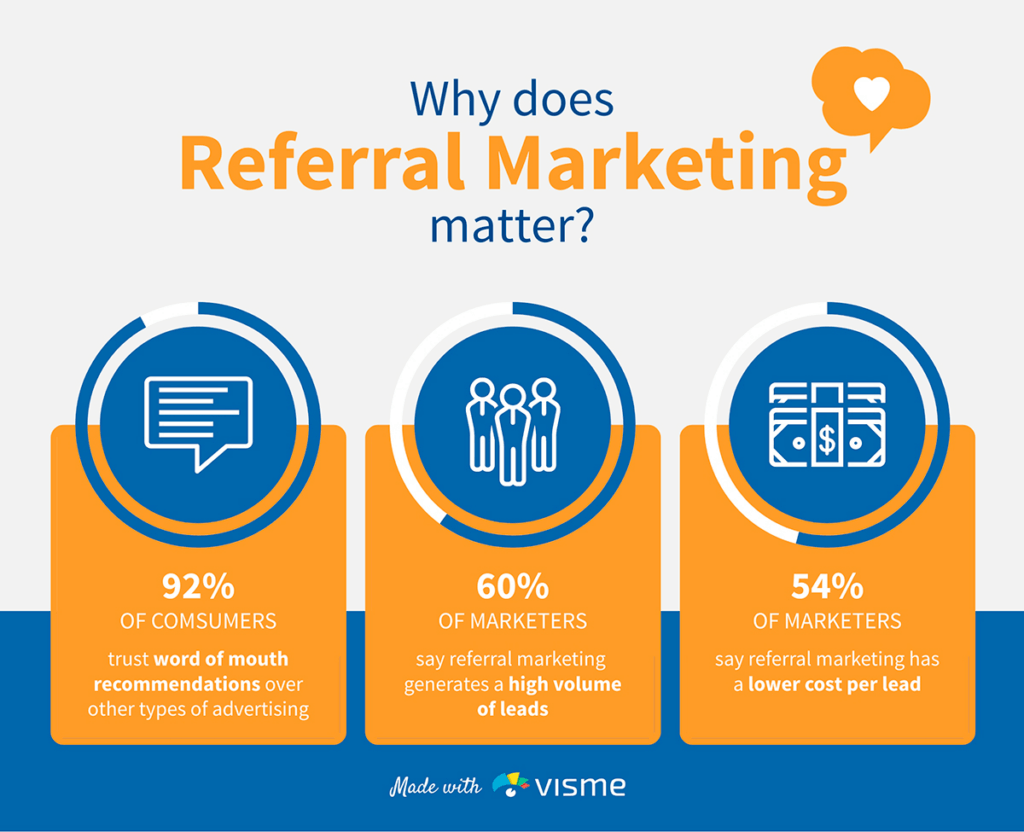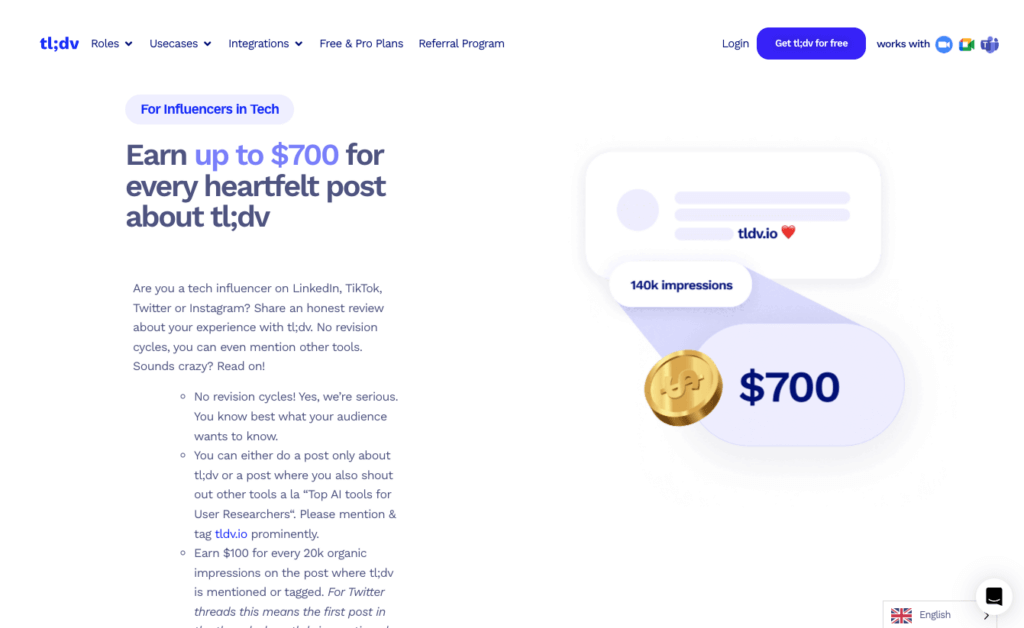Referral marketing has become a crucial strategy for businesses looking to grow and expand their customer base. In this comprehensive guide, we will delve into the world of referral marketing, exploring its definition, importance, mechanics, and different types. We will also discuss how businesses can implement a successful referral marketing strategy and measure its success through key performance indicators (KPIs). So, let's jump right in and uncover the power of referral marketing!
| Key Element | Description | Tips for Implementation |
|---|---|---|
| Understanding Referral Marketing | Harnesses the influence of existing customers to acquire new customers through word-of-mouth. | Identify target customers, create compelling incentives, develop a referral program, promote the program, and track results. |
| Importance of Referral Marketing | High conversion rate due to trust in recommendations, driving customer acquisition and fostering loyalty. | Set clear objectives, understand target audience, provide compelling incentives, offer easy-to-use referral tools, reward both referrers and referees, and promote the program. |
| Role in Business Growth | Maximizes lifetime value of existing customers, expands reach, and enhances customer satisfaction leading to overall business growth. | Implement strategies to encourage referrals, focus on customer satisfaction, and measure ROI. |
| Mechanics of Referral Marketing | Involves structured processes with incentives for successful referrals, often initiated by businesses. | Create a clear referral program with easy processes, provide user-friendly referral tools, offer attractive rewards, promote the program, and track results. |
| Types of Referral Marketing | Customer Referral Programs, Affiliate Referral Programs, Partner Referral Programs. | Choose the type that aligns with business goals, establish partnerships, incentivize referrers, and track performance. |
Understanding the concept
Referral marketing, also known as word-of-mouth marketing, is a powerful technique that harnesses the influence of existing customers to acquire new customers. It leverages the trust and recommendation of satisfied customers, who promote a product or service to their friends, family, or colleagues. This positive word-of-mouth endorsement is the driving force behind referral marketing's effectiveness.
Definition and importance
Referral marketing can be defined as a strategy that encourages and incentivizes individuals to refer others to a particular product or service. It capitalizes on the natural inclination of people to share positive experiences and recommendations with their social network.
Referrals are highly valuable for businesses because they tend to have a higher conversion rate compared to other marketing channels. When potential customers receive recommendations from their trusted sources, they are more likely to trust the product or service being endorsed. Trust plays a fundamental role in the buying decision-making process, making referral marketing a powerful tool for driving customer acquisition and fostering loyalty.

Role in business growth
Referral marketing is not just about acquiring new customers but also about maximizing the lifetime value of existing customers. By encouraging customers to refer others, businesses can tap into a network of potential customers who share similar interests and characteristics with their existing customer base.
When customers refer others, they are essentially vouching for the brand. This creates a ripple effect, expanding the reach of the business and attracting customers who are more likely to have a positive experience, leading to increased customer satisfaction and overall business growth.
The mechanics
Now that we have a clear understanding of referral marketing's definition and importance, let's explore how it works and the key components that make up a successful referral marketing strategy.
How it works
Referral marketing typically involves a structured process that encourages customers to refer others. This process is often initiated by the business, which provides customers with incentives or rewards for successful referrals.
The mechanics of referral marketing can vary depending on the business and industry, but the underlying principle remains the same. Customers are given a unique referral link or code that they can share with their contacts. When someone uses this link or code to make a purchase or sign up for a service, the referrer is rewarded. This normally happens through discounts, freebies, or other desirable benefits.
Key components of a referral marketing strategy
In order to create an effective referral marketing strategy, businesses need to have a clear plan in place. Here are some key components that should be considered:
- Identify target customers: Start by understanding the demography, behavior, and preferences of your existing customer base. This will help you identify the characteristics of the ideal customers who are most likely to refer others.
- Create compelling incentives: Incentives play a crucial role in motivating customers to refer others. Make sure your incentives are attractive and aligned with the value your product or service offers.
- Develop a referral program: Establish a clearly defined referral program with easy-to-follow processes and guidelines. This program should include details on how customers can share their unique referral link or code and how rewards will be distributed.
- Promote your referral program: Spread the word about your referral program through various channels, such as email marketing, social media, and your website. Create engaging content that highlights the benefits of joining the program and encourages participation.
- Track and measure results: Implement tracking mechanisms to monitor the success of your referral marketing strategy. This will help you identify trends, adjust your approach if necessary, and measure the return on investment (ROI) of your referral program.

Different types
Referral marketing comes in various shapes and forms. Let's explore the three main types:
Customer referral programs
Customer referral programs are the most common and straightforward type of referral marketing. They involve incentivizing existing customers to refer others to the business. By rewarding customers for successful referrals, businesses can tap into their loyal customer base and benefit from their positive experiences.

Affiliate referral programs
Affiliate referral programs engage individuals or organizations outside of the business as referrers. These individuals or organizations, known as affiliates, are motivated to promote the business in exchange for a commission or a percentage of sales generated through their referrals. Affiliate referral programs can be particularly effective for businesses with an online presence, as they can tap into the network and reach of these affiliates.

Partner referral programs
Partner referral programs involve collaborating with other businesses or organizations to refer customers to each other. This type of referral marketing is highly beneficial when there is a natural synergy between complementary products or services. By referring customers to trusted partners, businesses can enhance their offering and provide additional value to their customers.
Implementing a referral marketing strategy
Now that we have explored the mechanics and different types of referral marketing, let's discuss how businesses can successfully implement a referral marketing strategy.
Steps to create a successful referral program
Creating a successful referral program requires careful planning and execution. Here are some essential steps to follow:
- Set clear objectives: Define your goals and objectives for the referral program. Are you aiming to increase customer acquisition, improve customer retention, or drive sales? Having clear objectives will guide your decision-making process throughout the program's implementation.
- Understand your target audience: Gain a deep understanding of your target audience, including their preferences, motivations, and communication channels. This will help you tailor your referral program to resonate with your customers.
- Create compelling incentives: Develop incentives that are valuable to your target audience and align with the overall customer experience. Consider offering exclusive discounts, free upgrades, or even access to VIP events.
- Provide easy-to-use referral tools: Make it effortless for customers to refer others by providing user-friendly referral tools, such as customizable referral links, social sharing buttons, or email templates.
- Offer rewards for both referrers and referees: To encourage participation and make the program mutually beneficial, consider providing rewards for both the referrer and the referred customer. This can create a win-win situation and further motivate customers to participate.
- Promote your referral program: Spread the word about your referral program through various marketing channels, including email campaigns, social media posts, and dedicated landing pages. Communicate the benefits of participating and highlight success stories to generate excitement and engagement.

Tools and software
To streamline the implementation and management of a referral marketing strategy, businesses can leverage a wide range of tools and software. These platforms offer features such as automated referral tracking, customizable referral workflows, and analytics to measure the performance of the referral program. Some popular referral marketing tools include ReferralCandy, Cello, Refersion, and Ambassador.
Measuring success
Measuring the success of your referral marketing strategy is crucial to understanding its impact on your business. By tracking key performance indicators (KPIs), you can assess the effectiveness and ROI of your referral program.
Key Performance Indicators
Here are some important KPIs to consider when measuring the success of your referral marketing efforts:
- Referral conversion rate: Measure the percentage of referrals that result in a successful conversion, such as a purchase or sign-up.
- Referral traffic: Monitor the amount of website traffic generated through the referral program to assess its impact on your overall web performance.
- Customer lifetime value: Analyze the value generated by referred customers over their lifetime to determine the long-term impact of your referral program.
- Customer satisfaction: Collect feedback from both referrers and referees to gauge their satisfaction levels and assess the overall effectiveness of your referral program.
Analyzing and improving your referral marketing strategy
Continuous analysis and improvement are essential to optimizing your referral marketing strategy. Regularly review the performance of your program, identify areas for improvement, and implement necessary adjustments. Test different incentives, messaging, and promotional tactics to find what resonates best with your audience.
Remember, referral marketing is an ongoing process that requires dedication and adaptation. With the right strategy and tools in place, referral marketing can be a powerful driver of growth for your business. So, embrace the potential of word-of-mouth and start harnessing the power of referrals today!
Transform your SaaS growth with Cello
Ready to turn your users into a powerful growth engine? With Cello, you can effortlessly integrate a peer-to-peer referral program into your SaaS product in just hours. Experience the thrill of viral growth through a seamless sharing experience that's embedded right inside your product. Benefit from a 14% average free to paid conversion rate and a 12% annual user-to-customer conversion rate, all with minimal development time and immediate payback from day one. Our success-based pricing means you only pay when you see results. Book a demo today to see Cello in action and kickstart your user-led growth journey!
Resources
Related Articles

Why Your SaaS Referral Tracking Is Broken (& How to Fix It in 2026)
TL;DR Cookie-based referral tracking loses 25-40% of attributions due to ad-blockers (31.5% ...

Best Referral Program Software with Recurly Integration
The best referral program software for Recurly is Cello, which provides native, server-side ...

Best Referral Program Software with Paddle Integration
The best referral program software for Paddle users is Cello, which provides direct server-side ...

